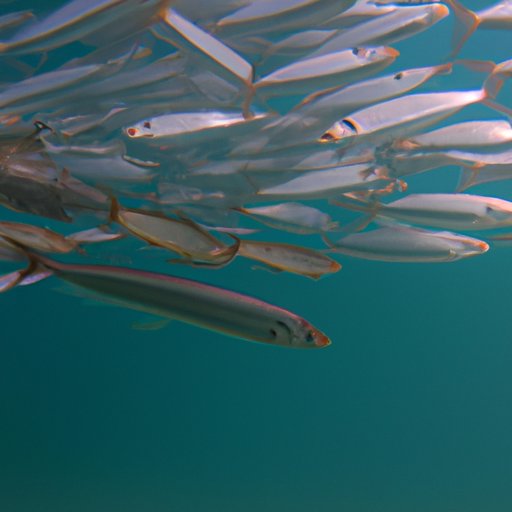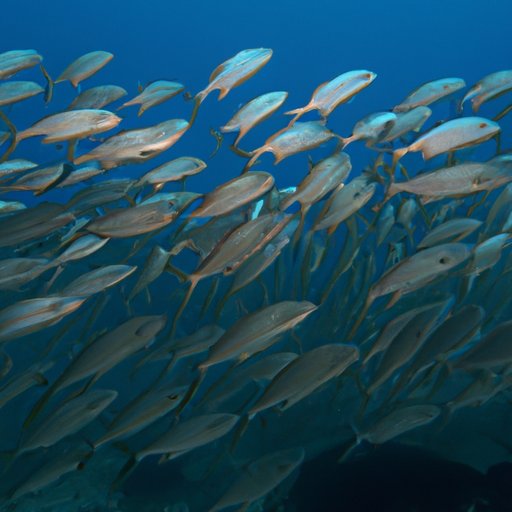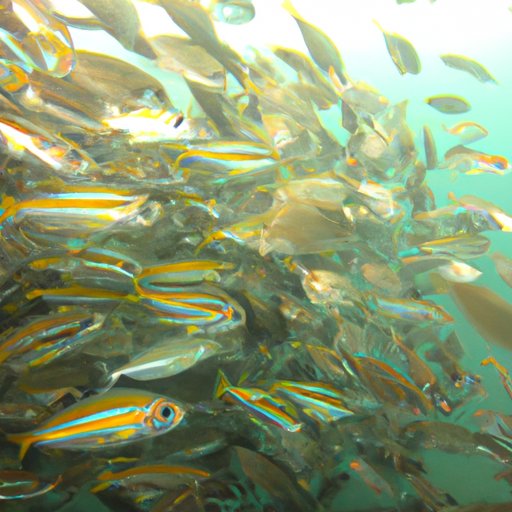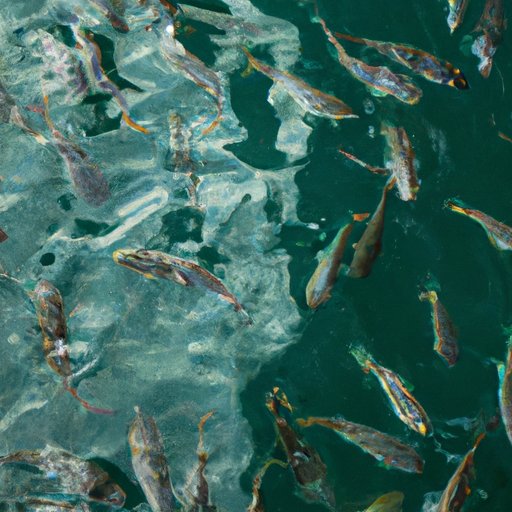Introduction
Schooling behavior is a common phenomenon in nature, especially among fish. It is defined as the tendency for fish to swim in coordinated groups or ‘schools’. This article will explore why fish travel in schools, examining the evolutionary benefits of this behavior. We will look at how schooling behavior can help fish increase their chances of survival by avoiding predators, finding food more efficiently, and maintaining their social structure.
Examining the Evolutionary Benefits of Schooling Behavior in Fish
Schooling behavior is an adaptive trait that has evolved in many species of fish. Studies have shown that there are several advantages to this type of behavior, including improved ability to find food, increased chances of survival, and better communication between individuals.
Advantages of Group Decision-Making
One of the most important benefits of schooling behavior is the improved ability to make collective decisions. According to research conducted by biologist Iain Couzin, “Fish that school together can respond to changes in the environment more quickly than if they were acting alone.” This means that fish are able to make decisions more quickly and effectively when they are in a group.
Improved Ability to Find Food
Another benefit of schooling behavior is that it helps fish to find food more efficiently. By swimming together in large groups, fish can increase their visibility and make it easier to spot potential sources of food. Additionally, studies have shown that fish that are in a school are more successful at catching prey than those that are solitary.
Increased Chances of Survival
Finally, research has also shown that schooling behavior can help fish to increase their chances of survival. By swimming in a group, fish are able to reduce the risk of predation and take advantage of collective decision-making to make better choices about where to move or hide from predators.

Exploring Why Fish Travel in Groups to Increase Their Chances of Survival
Schooling behavior can provide fish with several advantages that can help them to survive in their environment. We will now examine two of the main reasons why fish travel in groups: to avoid predators and to maintain their social structure.
Avoiding Predators
Schooling behavior is one way that fish can protect themselves from predators. When fish swim in groups, they form a cohesive unit that can be difficult for predators to penetrate. Additionally, fish that are in a group are able to make collective decisions about how to evade predators more quickly than if they were acting alone.
Maintaining Social Structure
Schooling behavior is also important for maintaining the social structure of a fish population. Studies have shown that fish that are in a school are more likely to cooperate with each other and exhibit higher levels of social interaction than those that are solitary. This can help to promote a sense of unity and cohesion within the group, which can lead to improved survival rates.

Investigating How Schooling Behavior Helps Fish Avoid Predators
Now that we have explored why fish travel in schools, let’s investigate how this behavior can help them to avoid predators. We will look at two strategies that fish use to increase their chances of survival: collective decision-making and group feeding.
Collective Decision-Making
When fish are in a school, they are able to make collective decisions about how to evade predators more quickly and effectively than if they were acting alone. This is because they are able to communicate with each other and share information about potential threats in their environment. As biologist Iain Couzin explains, “By pooling their individual knowledge and responding as a group, fish can make decisions that are more informed and more likely to result in successful evasive maneuvers.”
Group Feeding
Fish that are in a school are also able to take advantage of group feeding. Studies have shown that when fish feed in groups, they are more likely to be successful in finding food than if they were acting alone. This is because they are able to share information about potential sources of food and coordinate their movements to maximize their chances of success.
Analyzing the Advantages of Collective Decision-Making for Fish
Collective decision-making is an important part of schooling behavior, and it can provide fish with several advantages. Let’s examine two of the main benefits of this strategy: improved communication between fish and increased safety from predators.
Improved Communication Between Fish
When fish are in a school, they are able to communicate with each other more effectively than if they were acting alone. This is because they are able to share information about potential threats and make collective decisions about how to evade them. As biologist Iain Couzin explains, “The ability to communicate with others in the group allows fish to rapidly assess their environment and react appropriately to any potential dangers.”
Increased Safety from Predators
Collective decision-making can also help fish to increase their safety from predators. When fish are in a school, they can make informed decisions about how to evade predators more quickly and effectively than if they were acting alone. Additionally, the presence of a large number of fish in a school can make it more difficult for predators to identify and target individual fish.
Uncovering the Potential Advantages of Group Feeding for Fish
Group feeding is another important part of schooling behavior, and it can provide fish with several advantages. Let’s examine two of the main benefits of this strategy: a higher success rate for finding food and more efficient use of resources.
Higher Success Rate for Finding Food
When fish feed in groups, they are more likely to be successful in finding food than if they were acting alone. This is because they are able to share information about potential sources of food and coordinate their movements to maximize their chances of success. As biologist Iain Couzin explains, “By pooling their individual knowledge and responding as a group, fish can make decisions that are more informed and more likely to result in successful feeding behaviors.”
More Efficient Use of Resources
Group feeding can also help fish to make more efficient use of resources. When fish are in a school, they are able to divide up tasks and specialize in different roles, such as searching for food, defending the group, or protecting the young. This means that they can make better use of their energy and resources, increasing their chances of survival.

Analyzing How Schooling Behavior Can Help Fish Find Food More Efficiently
Schooling behavior can also help fish to find food more efficiently. We will now examine two strategies that fish use to increase their chances of success when searching for food: increased visibility and quicker reaction time.
Increased Visibility
When fish are in a school, they are able to increase their visibility and make it easier to spot potential sources of food. This is because the presence of a large number of fish in a school can attract the attention of potential prey. Additionally, the movement of the school can create turbulence in the water, making it easier for fish to detect vibrations from potential sources of food.
Quicker Reaction Time
Schooling behavior can also help fish to react more quickly to potential sources of food. When fish are in a school, they are able to communicate with each other and share information about potential sources of food. This enables them to make collective decisions about how to approach potential sources of food more quickly than if they were acting alone.
Investigating How Schooling Behavior Helps Fish Maintain Their Social Structure
Schooling behavior is also important for maintaining the social structure of a fish population. We will now examine two of the main ways in which this behavior can help fish to stay organized: promoting cooperation and enhancing individual performance.
Promoting Cooperation
When fish are in a school, they are more likely to cooperate with each other and exhibit higher levels of social interaction than those that are solitary. This can help to promote a sense of unity and cohesion within the group, which can lead to improved survival rates. Additionally, studies have shown that fish that are in a school are more likely to display cooperative behaviors, such as helping each other to search for food or defend the group from predators.
Enhancing Individual Performance
Schooling behavior can also help fish to enhance their individual performance. When fish are in a school, they can divide up tasks and specialize in different roles, such as searching for food, defending the group, or protecting the young. This means that they can make better use of their energy and resources, increasing their chances of survival.
Conclusion
In conclusion, this article has explored why fish travel in schools, examining the evolutionary benefits of this behavior. We have seen that schooling behavior can help fish increase their chances of survival by avoiding predators, finding food more efficiently, and maintaining their social structure. Additionally, we have investigated how this behavior can help fish to make collective decisions, enhance their individual performance, and make more efficient use of resources. These findings have implications for further research into the adaptive strategies of fish and other animals that exhibit schooling behavior.
(Note: Is this article not meeting your expectations? Do you have knowledge or insights to share? Unlock new opportunities and expand your reach by joining our authors team. Click Registration to join us and share your expertise with our readers.)
